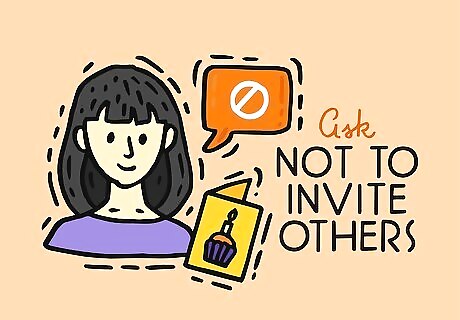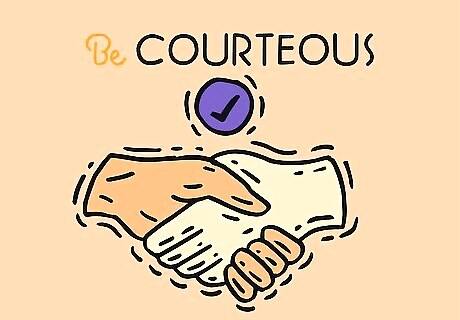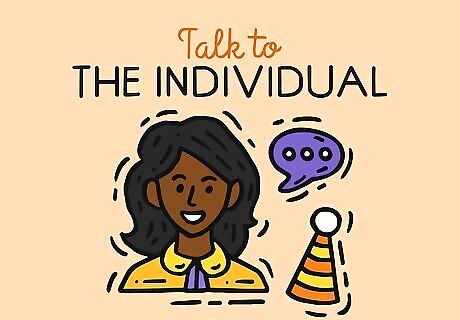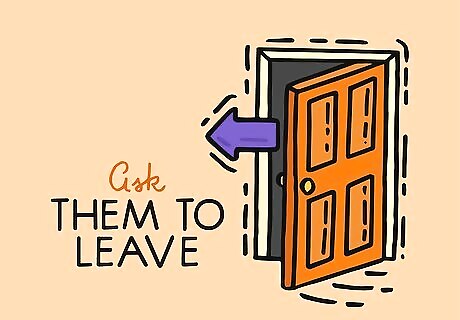
views
Revoking an Unintended Invitation

Uninvite the person online if you can. Not all party invitations are sent online, but many are. If you created an event for your party on a social media platform like Facebook, you can remove people from the event's list of invited people. This individual will not receive any notification that you've uninvited them; instead, they will simply stop getting messages and notifications about the party. Navigate to your party's event page. On the right side of the page you should see a list of guests sorted by the following categories: "going," "maybe," and "invited." Search for the individual you would like to uninvite and click the "X" next to that person's name.

Let the person know why they are uninvited. Whether you accidentally invited the individual through a mass online invitation or that person heard about your party through the grapevine, it may be best to be direct with the individual. Let them know that you didn't mean to invite them, and consider explaining why they are not invited. If you don't want someone at your party because they tend to insult others or get too drunk, tactfully tell this person about your reasons. For example, you might say something like, "I'm really sorry but I think it would be best if you didn't come to my party. You have a tendency to (drink too much/say mean things/etc.), and I don't want that happening at my party." If you think this individual can behave, then you may want to offer them a chance to improve their behavior. You could say something like, "You can come if you promise not to ______ at the party."

Make up an excuse. If you don't want to acknowledge the person's problematic behavior but still don't want them at your party, you might try making up an excuse for why they can't come. Remember, however, that making up an excuse can be just as uncomfortable as telling the person the truth about why they are uninvited. Try telling the individual that too many people said they are coming and that you'd rather meet with them one-on-one for coffee instead of at the already-crowded party. If you're co-hosting the party with someone, like another friend or a significant other, you might say that the co-host asked that you uninvite a few people; however, make sure your co-host knows about this and is okay with it first.

Consider making the party more exclusive. It may be hurtful to uninvite a single person, but uninviting a group of people could make it easier. For example, you might change your party to a gender-specific invitation group, making it an all-girls or all-boys party, or perhaps making it a couples-only event. Again, this can be confusing if the person has already accepted the invitation, and it might require a bit of explanation over the phone or in-person.

Cancel the party and reschedule it as a last resort. One last option might be to cancel the event altogether. You can make up an excuse for why the event was canceled, then invite people to a new party on a different date. Just be sure that you send out invitations a little more carefully the second time to avoid being in the same situation again. This can be a lot of trouble, and it may still offend the person that you uninvited. Use this method with caution.
Uninviting Someone You No Longer Want There

Talk to the person face-to-face. If you're going to uninvite someone, you should not do it by text or email. It's an unpleasant situation, but depersonalizing it will only add to the hurt feelings. Texts, emails, and social media correspondences are best for casual communication, but uninviting someone requires a bit more tact and diplomacy. If a face-to-face conversation isn't possible (like if the person lives out of town), a phone call is the next best thing. Be polite but remain firm in your convictions. Always apologize when you uninvite someone. Say something like, "I know that I had initially invited you to the party, but I'm now cutting back on the number of people I'm having over. I'm sorry about the cancelation! I would love to have you over another time."

Avoid putting off the conversation. The situation is difficult and it's certainly stressful for you, but putting it off will not make it any easier. You're going to have to have a frank conversation with that individual eventually, and the sooner you do it the sooner you can unwind and get back to planning for your fun party. Waiting to uninvite someone will only build tension, and it may make it more inconvenient for the uninvited guest if they have to make travel plans or arrange for a babysitter, for example.

Prepare yourself for the conversation. Consider and prepare for any questions that may come up when you uninvite the person—after all, they’ll probably want to know why you changed your mind. Understand that this may lead into a more in-depth, difficult conversation—uninviting the person may force you to talk about something like a behavior issue or an addiction. Think about why you are uninviting the person and the best way to discuss this with them before you have that conversation. Try writing out what you want to say and your reasons for uninviting the guest. Think about the other person's point of view and how you would feel in their position. Though you may be upset, prepare to listen to their perspective with respect and compassion.

Be honest and direct. Uninviting someone may hurt that individual's feelings, but lying to them about your reasons could make a tough situation even worse. If the uninvited guest finds out why they were uninvited and your story contradicts the truth, it could do more damage than the revoked invitation alone would have done. Tell the individual why you're uninviting them. If it's because of a fight, or because they recently broke up with a close friend, let the individual know that's your reason. If you're uninviting someone but still value their friendship, let them know that it's not personal. Reiterate that you don't want to offend them but would prefer that they didn't come. Imagine you are uninviting a friend to your daughter's birthday party. When they ask why they’re no longer invited, you may need to say something like, "When you were at Jeff's birthday party last weekend, you got drunk and said some really offensive things. It made everyone really uncomfortable and upset. I want my daughter's birthday to be drama-free, and for the focus to be on her, and right now I don't feel that I can trust you to come and not make another scene." If you want to continue being friends with this person, you may offer to help them with their drinking problem, or encourage them to make amends to the people they offended. Let them know that you want to help, but that this party is about your daughter and making sure she has a great day.
Coping with an Unwanted Guest at Your Party

Ask guests not to invite others. If you're throwing a small party at home, it's not unheard of for one of your guests to invite their friend or neighbor; however, this might make you feel like your privacy is being invaded a little, or it may put an extra strain on your party budget or supplies. If you don't want any uninvited guests, let the people you do invite know that it's an invitation-only event. Whether you send out formal invitations, an email blaster, or just word-of-mouth invitations, let everyone know that you'd like to keep it small and intimate. If you'd like to proceed on a case-by-case basis, you could always ask your guests to clear it with you first before they invite anyone else. If you don't want anyone to bring guests, then send out an RSVP card that does not have a "plus one" option. Use cards that only have a "yes" or "no" option for guests to fill out.

Be as courteous as possible. The best way to defuse a potentially hostile or awkward situation is to be polite and courteous. Remember that even if you did not want someone at your party, you are still the host and that individual is your guest. Treat people the way you would want to be treated. Be cordial and welcoming, even if you don't like the person or didn't want them to come.

Decide whether to confront the unwanted guest. Over the course of your party, you may feel tempted to speak with the unwanted guest. You should carefully weigh the decision to intervene, assessing what kind of damage the individual is doing and how frequently you will have to interact with that guest in the future. If you only see the individual every few weeks or months, you may not worry as much about offending that individual. By the same token, though, if you see each other infrequently it may not be worth correcting that individual's behavior. If you know the individual will not listen to you, having a serious talk may be a waste of time. If the individual is not causing any problems, it's generally best to bite your tongue. You can accommodate one or two additional guests, so long as they're being agreeable and getting along with everyone. If the individual is upsetting the rest of your guests, you may need to address their behavior. You should do so in private by asking to speak with that guest in another room.

Talk to the individual. You may need to speak with the unwanted guest about their behavior if they are making other people uncomfortable, or you may simply decide to address the individual's presence at the party. Either way, you'll need to be very careful and choose your words carefully. Address the individual's behavior, not the individual. Be clear and direct about what you would like that person to do differently. It's best to avoid being confrontational. Remember that people like being asked questions and given options instead of being given commands. Say something like, "I really want this party to be fun for everyone, but your behavior is causing problems. You can stay if you stop ______, but if not I think you should leave."

Ask the individual to leave. If you're really having a hard time coping with the individual at your party, you may want to consider asking them to go home. This can be difficult, but it's best to be direct with the individual and let them know why you're uncomfortable with them being there. Ask the individual to speak with you in private. Don't kick someone out in front of the other party guests. Say something like, "I'm really sorry, but I'm just not comfortable with you being here. I think it would be best for everyone if you left." If you feel comfortable with it, you can also explain to the individual why you want them to leave. Don't be rude, though; be straightforward yet polite.


















Comments
0 comment